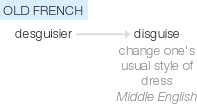Disguise
Middle English (meaning ‘change one's usual style of dress’, with no implication of concealing one's identity): from Old French desguisier .
wiktionary
From Middle English disgisen, disguisen, borrowed from Old French desguiser (modern French déguiser), itself derived from des-(“dis-”) (from Latin dis-) + guise(“guise”) (from a Germanic source).
etymonline
disguise (v.)
c. 1300, "conceal the personal identity of by changes of guise or usual appearance, with intent to deceive," from Old French desguiser "disguise, change one's appearance" (11c., Modern French déguiser), from des- "away, off" (see dis-) + guise "style, appearance," which is from Germanic (see guise).
From mid-14c. as "conceal or cover up the original character of by a counterfeit form or appearance." Originally primarily "to put out of one's usual manner" (of dress, etc.), "change one's appearance;" a sense preserved in phrase disguised with liquor (1560s) "being changed in behavior by intoxication."
It is most absurdly said, in popular language, of any man, that he is disguised in liquor; for, on the contrary, most men are disguised by sobriety. [Thomas De Quincey, "Confessions of an English Opium-Eater," 1856]
Related: Disguised; disguising.
disguise (n.)
c. 1400, "strange style of dress" (especially one meant to deceive), from disguise (v.). Meaning "false or misleading appearance, something that serves or is intended for concealment of identity" is from 1630s. Disguisement in this sense is from 1570s but now is disused.
